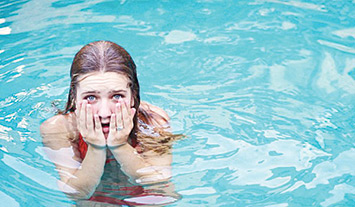Summer’s here: Don’t pee in the pool
 Olympic medalist Michael Phelps said it: “There are two kinds of swimmers in this world: Those who pee in the pool, and those who lie about it.”
Olympic medalist Michael Phelps said it: “There are two kinds of swimmers in this world: Those who pee in the pool, and those who lie about it.”
Lots of folks will be jumping into the pool this summer and having so much fun that they may not want to take the time to jump out to use the restroom. But let’s be frank: Peeing in the pool is gross.
NOT JUST GROSS, IT’S HARMFUL
Without a doubt, peeing in the pool is also harmful to our health. The CDC gives two reasons: Pee, like poop, sweat, dirt, skin cells and personal care products, such as deodorant and makeup, can chemically react with the chlorine in the pool, you know the stuff that is supposed to kill germs in the pool. This reaction not only decreases the amount of chlorine available in the pool but also generates chloramines which can irritate your eyes, skin, nose and breathing passages – and even trigger asthma attacks.
A study published in the journal Environmental Science and Technology showed how the nitrogen in pee can react with chlorine to form cyanogen chloride, which can act like tear gas. Yes, tear gas.
In fact scientists wonder whether exposure to trichloramine also is linked to rising rates of childhood asthma. If you have asthma or swim frequently, pool chemicals may cause respiratory problems, even without the urine effect.
Scientists in the U.S. and China studied why those two compounds, trichloramine and cyanogen chloride, were popping up in pool water. They traced them back to chemicals whose most likely source was bodily fluids … namely, urine.
“A common misconception within the swimming community is that urination in pools is an acceptable practice, although signs and placards are posted in many pools to encourage proper hygiene. It is also well known that many swimmers ignore these warnings, particularly noteworthy among these are competitive swimmers,” said study author Ernest R. Blatchley III, a professor of civil engineering at Purdue University.
Yep, a fifth of all American swimmers admitted to doing their business in the pool, according to a survey by the Water Quality and Health Council. The survey found that most people who used pools didn’t realize the diseases that a contaminated pool could carry.
So, do you really need to worry when you take that next dive?
WHAT’S REALLY IN THAT POOL WATER?
Let’s just start with the premise that the pool you dive into will contain pee, because it probably will. There’s also probably going to be a wee bit of fecal matter, a dollop of human sweat and some skin cells floating around.
It’s fair to say that details aside, it would take a heck of a lot of urine to turn a pool so toxic that it would kill you outright. But could the much smaller amounts generated in an actual pool do any harm?
Aside from the gross-out factor (ever swim next to someone in a pool and suddenly find the water getting warmer?) the answer is Yes, it’s a fact, Jack. Your you-know-what can combine with the chlorine in pools to create a nasty bit of chemistry.
And then there’s good old Number Two. Research has determined that the total percentage of bacteria in a swimming pool can reach 92.3 percent while the rate of coli bacteria found in fecal matter can be as high as 96.9 percent.
The consequences of this can be fatal. In 2008, one man died and 3,158 swimmers were critically poisoned when they swallowed the pool’s water which was laced with the urine and fecal matter of 47,000 swimmers in the gigantic Mao Mao Municipal Pool in Beijing.
A toxicologist noted after taking a sample of the water that urine and fecal matter consisted of nearly 90% of the mix. Yuck.
So the next time you’re at the swimming pool, heed those warning signs but also be wary of your fellow swimmers. And it’s probably best to avoid the kiddie pool.



Leave a Reply